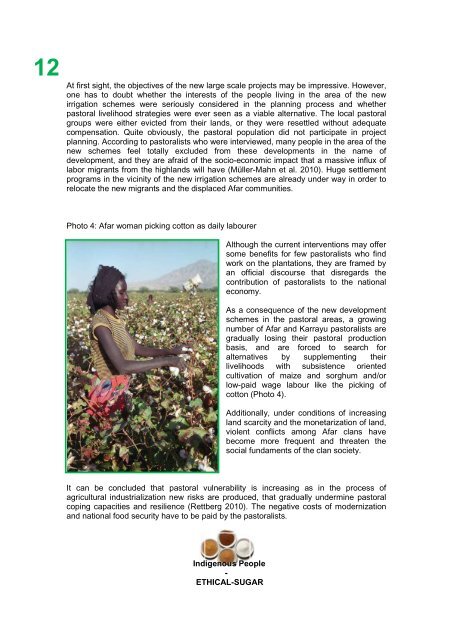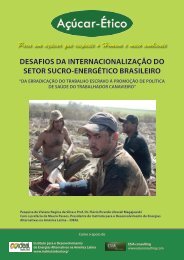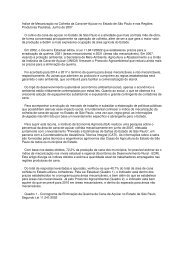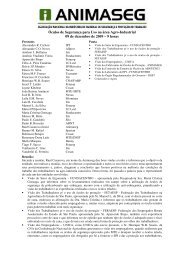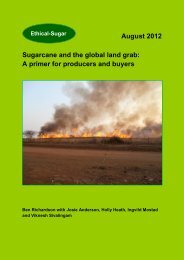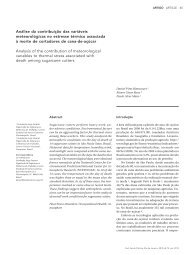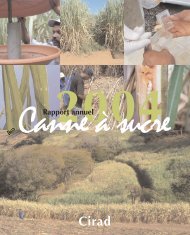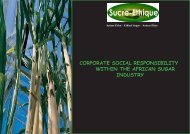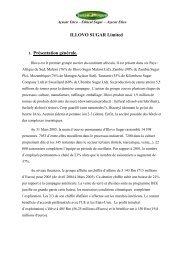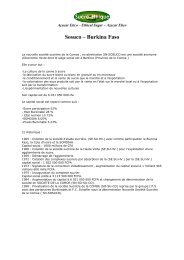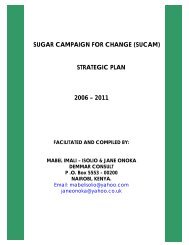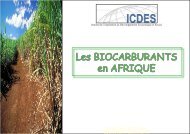12At first sight, the objectives of the new large scale projects may be impressive. However,one has to doubt whether the interests of the people living in the area of the newirrigation schemes were seriously considered in the planning process and whetherpastoral livelihood strategies were ever seen as a viable alternative. The local pastoralgroups were either evicted from their lands, or they were resettled without adequatecompensation. Quite obviously, the pastoral population did not participate in projectplanning. According to pastoralists who were interviewed, many people in the area of thenew schemes feel totally excluded from these developments in the name ofdevelopment, and they are afraid of the socio-economic impact that a massive influx oflabor migrants from the highlands will have (Müller-Mahn et al. 2010). Huge settlementprograms in the vicinity of the new irrigation schemes are already under way in order torelocate the new migrants and the displaced Afar communities.Photo 4: Afar woman picking cotton as daily labourerAlthough the current interventions may offersome benefits for few pastoralists who findwork on the plantations, they are framed byan official discourse that disregards thecontribution of pastoralists to the nationaleconomy.As a consequence of the new developmentschemes in the pastoral areas, a growingnumber of Afar and Karrayu pastoralists aregradually losing their pastoral productionbasis, and are forced to search foralternatives by supplementing theirlivelihoods with subsistence orientedcultivation of maize and sorghum and/orlow-paid wage labour like the picking ofcotton (Photo 4).Additionally, under conditions of increasingland scarcity and the monetarization of land,violent conflicts among Afar clans havebecome more frequent and threaten thesocial fundaments of the clan society.It can be concluded that pastoral vulnerability is increasing as in the process ofagricultural industrialization new risks are produced, that gradually undermine pastoralcoping capacities and resilience (Rettberg 2010). The negative costs of modernizationand national food security have to be paid by the pastoralists.Ethicl<strong>Indigenous</strong> <strong>People</strong>-ETHICAL-SUGAR
13The likely impact of sugar cane plantations on pastorallivelihoods of the proposed Tana River Delta sugarcane projectBy Tom Odero OmbogoThe Tana delta derives its name from the Tana River in the Tana River district. Thedistrict occupies a total area of 38,782 square kilometers with an estimated population of227,851 people. It derives its name from the largest river in Kenya, which traverses thenorthern and eastern part of the district and drains into the Indian Ocean.The main livelihoods systems in the district are pastoralism and farming with a smallproportion of the population engaged in fishing. The Tana River, believed to be Kenya’slongest river, courses south from Garissa in the dry northeast, subsequently turns to theEast to reach the sea. A gigantic triangle of landmass that extends from the river estuaryat Kipini in the South to Mnazini and Lazima villages in the North constitutes the delta ofthe Tana River (see Map 1).The delta is a mosaic of seasonally flooded grasslands, patches of palm savanna,fragmented forests, satellite lakes, mangrove trees, beaches and the river itself. Thedelta’s ecosystem supports indigenous communities, large numbers of livestock, wildlifeand avifauna. Farmers cultivate on receding lake edges, seasonally fertile floodplains,and where the river spills fresh water into their fields with the tidal flow. Other peopleraise livestock or engage in fishing. The delta, that forms the proposed sugardevelopment site covers a total of 8 administrative divisions namely; Bura, Madogo,Bangale, Galore, Wenje, Garsen, Tarasaa and Kipini. The eight divisions fall under thejurisdiction of Tana River County Council.Socio-demographic characteristicsAccording to the Poverty Reduction Strategy Paper (PRSP) 2000 -2004, the Tana Riverdistrict, where the delta is found, is one of the of the poorer Districts in Kenya. It has anaverage distance to nearest source of water by household (km) of 1.22km. The averagehousehold size as reported by the respondents in discussions was Wardei 8.87 persons,Orma 10.36 persons, and Pokomos 6.52 persons.The estimated total permanent population at the delta is 65,000 people of which 44% arePokomos, 44% Ormas, 8% Wardei while other Ethnic groups account for the remaining4%. The Wardei are a smaller group originating from Ethiopia who are also pastoralists.The Pokomo are mainly subsistence farmers who farm along the River Tana. The areaalso has other minority groups that include the Wataa, (Sanyes), Malakote andMunyoyaya. Their way of life is close to that of pastrolists Orma and Wardei. They havediversified to mixed farming that involves; cultivation along the river, bee keeping, fishingand trade. The area is home to other Kenyan ethnic groups. These include the Luos,Kambas, Taitas, Giriamas, and Kikuyus.The area is characterized by a migratory population consisting of livestock herders, whomigrate to the lower plains during Ethicl the drought months of January and<strong>Indigenous</strong> <strong>People</strong>-ETHICAL-SUGAR


